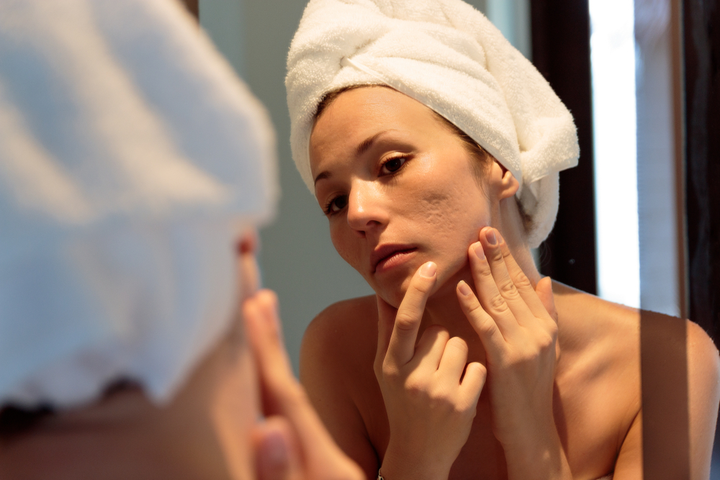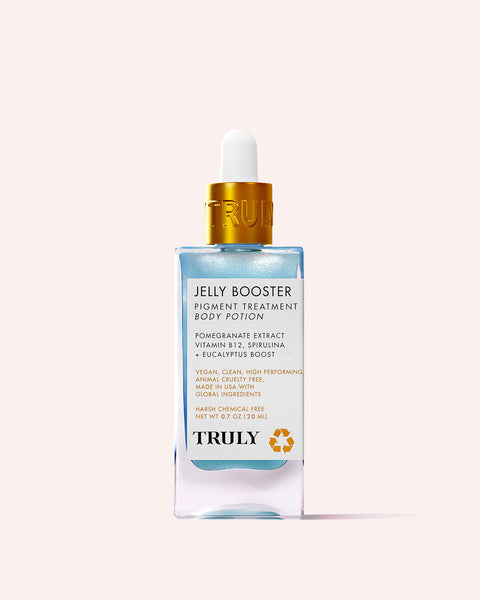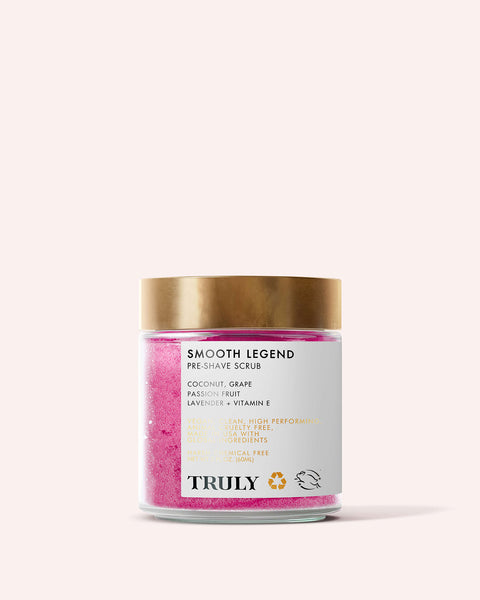Do Acne Scars Go Away?

If you're dealing with the aftermath of acne, you're probably wondering or googling: do acne scars go away?
Acne scars are indeed frustrating. Just when you think you've finally seen the back of those pesky pimples, a scar appears, deeply etched in your skin to remind you that your acne isn't gone just yet.
The good news is, there are plenty of acne scars treatments you can try to finally get clear, even skin. Here's everything you should know about acne scars, do acne scars go away and the best ways to treat them.
Why Do People Get Acne Scars?
Acne scars occur when your body tries to repair your acne. Acne lesions penetrate the skin deeply, damaging the tissues in the deeper layers of skin. As a result, marks or pits are left behind. They can also occur if your body produces too much or too little collagen.
Severe forms of acne that cause cysts or nodules result in the most severe scarring, which is typically harder to treat. Moderate forms of acne, such as whiteheads, blackheads, and papules can also cause scarring but this type of scarring is easier to treat.
You're more likely to get acne scars if you squeeze or pick at acne lesions. That's why dermatologists advise against popping your pimples, as it can prolong the healing process.
Types of Acne Scars
If you want to know do acne scars go away it's worth knowing about the acne scars you may be dealing with. There are several different types of acne scars: atrophic (caused by loss of tissue) and hypertrophic (caused by excess tissue).
Acne Atrophic Scars
Atrophic scars, also known as depressed acne scars, occur when the body produces too less collagen. There are three types including rolling acne scars (soft, shallow scars), ice pick acne scars (small, narrow scars that point downwards), and boxcar acne scars (broad, squarish scars with sharply defined edges).
Acne Hypertrophic Scars
Hypertrophic scarring, or raised scars, occur when the body produces too much collagen. They appear most commonly on the chest and back. People with darker skin are more likely to develop these acne scars.
Post-Inflammatory Hyperpigmentation
Alongside scarring, acne can leave behind dark spots and discoloration after healing. This is known as post-inflammatory hyperpigmentation and usually happens when your skin is damaged by picking or squeezing your acne.
Who Gets Acne Scars?
It could be genetics making you more vulnerable to acne scars. If you have a family history of acne scars, it could be that your skin is more susceptible to scarring.
You can also be more prone to acne scarring if you have oily skin, or active sebaceous glands. This is because these conditions lead to an inflammation process in that area which will cause a higher risk of acne scars developing as well as making them harder to fade.
Do Acne Scars Go Away Over Time?
Some acne scars, such as those that leave behind red or brown marks, usually fade over time on their own. However, it can take a year or longer for them to fully heal.
The majority of acne scars will not go away unless they are treated. Unfortunately, most acne scars take a long time to heal which is why it's important to start treating them as early as possible.
With the right skincare products, used consistently, you should notice an improvement in the appearance of your acne scars within a few months.
How Long Does it Take for Acne Scars to Go Away?
Do acne scars go away eventually? Acne marks (post-inflammatory hyperpigmentation) usually fade within 3-6 months. Acne scars, on the other hand, may take a lot longer. In fact, the majority of acne scars won't go away without treatment.
Moderate acne scars can take six months or more to fade. Severe acne scarring takes a lot longer to heal and usually requires in-office procedures to see a visible improvement.
There's really no set time frame when it comes to healing acne scars. Most important, start an acne scar treatment as soon as you can to speed up the overall healing time.
How to Get Rid of Acne Scars
Do acne scars go away? They do if you use the right skincare products and treatments. There are several home treatments for acne scars to fade their appearance over time.
Alpha Hydroxy Acids
Alpha hydroxy acids (AHAs) help exfoliate the outer surface of the skin to remove dead skin cells and unclog pores, improve skin texture and fade discoloration.
Lactic acid and glycolic acid are among the best AHAs for resurfacing and renewing skin for improved texture. They also help to remove pigmented skin cells while stimulating collagen production for fresher, plumper skin.
Vitamin C
Vitamin C is a powerful antioxidant that treats acne scars by boosting collagen production, helping to rebuild healthy skin and accelerate the healing of acne scars.
Thanks to its brightening effects, vitamin C is also effective for treating hyperpigmentation caused by acne. What's more, it's known for protecting skin against free radicals and ultimately preventing premature aging.
Retinol
Do acne scars go away with retinol use? The derms say yes. Retinol is a powerhouse ingredient for improving the appearance of acne scarring. This derivative of Vitamin A can increase collagen production to rejuvenate the skin, improve texture, and reduce the appearance of acne scarring.
Retinol also speeds cellular turnover, which helps to remove dead skin cell buildup to reveal fresh, scar-free skin. Additionally, retinol is known for its ability to treat and prevent signs of aging due to its collagen and elasticity restoring properties.
Pomegranate Extract
Packed with antioxidant and anti-inflammatory properties, pomegranate extract helps with a number of skin concerns including discoloration, scarring, dryness, fine lines and wrinkles, and irritation.
It's an ultra nourishing skincare ingredient that's basically food for your skin. While studies are limited to its effects on acne scars, studies prove it can help reduce the appearance of hyperpigmentation.
Best Acne Scar Treatments
Below, some of our fave products for removing acne scars at home. Do acne scars go away with the right skincare treatments? Yes!
Jelly Booster Pigment Body Potion
SHOP NOW
Jelly Booster Pigment Serum is an advanced formula of pomegranate extract and vitamin B12 that work together to increase collagen production, stimulate skin cell regeneration, and improve the appearance of hyperpigmentation and acne scars.
Vegan Collagen Booster Face Mask
SHOP NOW
Vegan Collagen Booster Face Mask contains a scar-fading blend of retinol, vitamin C, and plant collagen booster to leave skin bright, firm, and smooth.
#Heart Your Imperfections Blemish Patches
SHOP NOW
Prevent and treat acne scars with these healing blemish patches. They're formulated with hydrocolloid to unclog pores and speed up healing.
Dragon Milk Anti-Blemish Body Lotion
SHOP NOW
A lotion loaded with acne-fighting salicylic acid and resurfacing glycolic acid to deliver a double punch to pesky bodne and acne scars.
How to Prevent Acne Scars
The best way to prevent acne scars is to prevent acne in the first place. You can do this by following an acne-fighting skincare routine using ingredients like salicylic acid, benzoyl peroxide, and glycolic acid which clear the pores and prevent breakouts.
Tips to Prevent Acne Scars
- Wash your face with a BHA-based cleanser twice a day (morning and night).
- Exfoliate 1-2 times per week to remove the buildup of dirt, oil, and dead skin cells that clog the pores and trigger breakouts.
- Moisturize after cleansing to seal in moisture, keep the skin barrier strong, and avoid excessive oil production.
- Don’t pick, pop, or scratch blemishes, as this can lead to more scarring.
- Wear sunscreen daily to protect skin against free radical damage which leads to dark spots and discoloration.
So, do acne scars go away? With the right skincare treatments, your acne scars should disappear within a few months. Although, it may take a year or more for them to completely clear if you're dealing with severe scarring.
Watch our how to get rid of acne scars tutorial:












